The post Người Việt Nam nghĩ gì về cuộc sống hiện tại so với cuộc sống của cha mẹ mình ngày xưa? appeared first on Indochina Research.
]]>Hầu hết người Việt cảm thấy rằng họ đang sống cuộc sống tốt hơn so với cha mẹ mình.
Theo khảo sát toàn cầu do Hiệp hội Quốc tế Gallup (GIA) thực hiện năm 2022, cứ hai người (51%) thì có một người tin rằng cuộc sống của họ bây giờ đang tốt hơn cuộc sống của cha mẹ họ ngày trước. Điều này đã thể hiện một cái nhìn tích cực hơn về cuộc sống của thế hệ ngày nay so với thế hệ trước.
Trong tất cả các khu vực, Nam Á là vùng có tỷ lệ cao nhất với 60% người dân tin rằng cuộc sống của họ tốt hơn cuộc sống của cha mẹ họ ngày trước. Trong số các quốc gia và vùng lãnh thổ Nam Á được khảo sát, Việt Nam là quốc gia lạc quan nhất, với 83% dân số chọn đáp án ‘tốt hơn’. Theo sát là Hàn Quốc (75%) và Pakistan (65%).
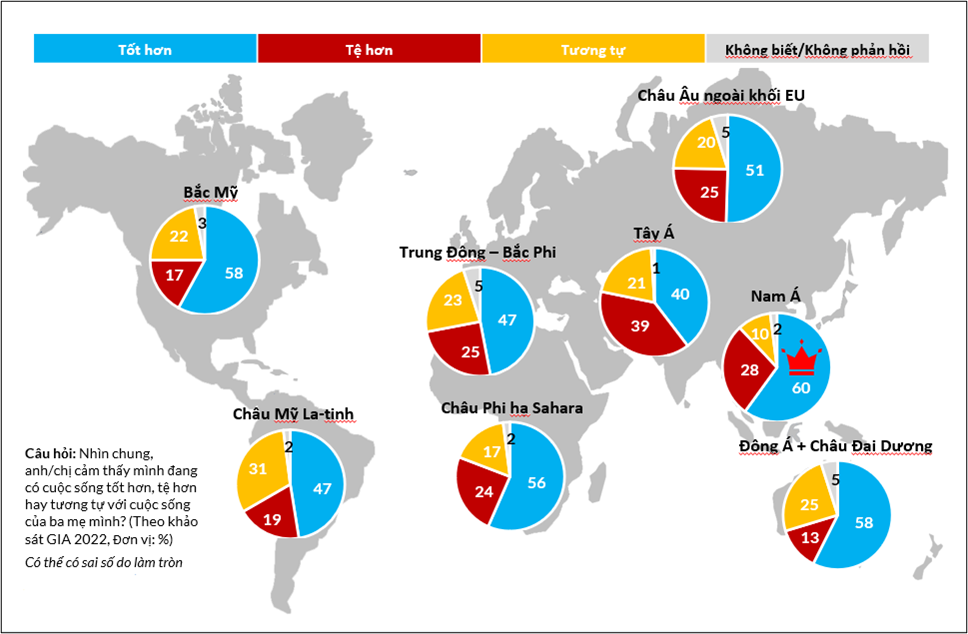
Cứ 10 người Việt Nam thì có 3 người cho rằng trẻ em hiện tại đang có cuộc sống tốt hơn họ ngày xưa.
Mặc dù Việt Nam đứng đầu trong các quốc gia Nam Á về mức độ hài lòng với cuộc sống hiện tại so với cuộc sống của cha mẹ họ (83%), nhưng người Việt vẫn không chắc chắn về triển vọng và cơ hội dành cho các thế hệ tương lai. Chỉ có khoảng 3 trên 10 người Việt Nam được hỏi (29%) tin rằng cuộc sống của con cái sau này sẽ tốt hơn cuộc sống của họ. Điều này chênh lệch đáng kể (54%) so với việc họ nghĩ rằng cuộc sống hiện tại của mình đã tốt hơn cuộc sống của cha mẹ ngày trước (83%).
Mặc dù không quá đáng kể nhưng các quốc gia và lãnh thổ khác trong khu vực cũng bày tỏ quan điểm về cuộc sống trong tương lai của con trẻ không khả quan tương tự như Việt Nam, chẳng hạn như Hàn Quốc (56%), Thái Lan (51%), Hồng Kông (48%), Ấn Độ (43%) và Nhật Bản (21%).
Điều thú vị là người dân ở Philippines (9%), Indonesia (7%) và Pakistan (4%) tin rằng tương lai của con cái họ sẽ tốt hơn chính mình. Điều này thể hiện sự lạc quan vào tương lai hoặc các vấn đề thực tế mà người dân nước họ mong muốn giải quyết cho thế hệ sau.
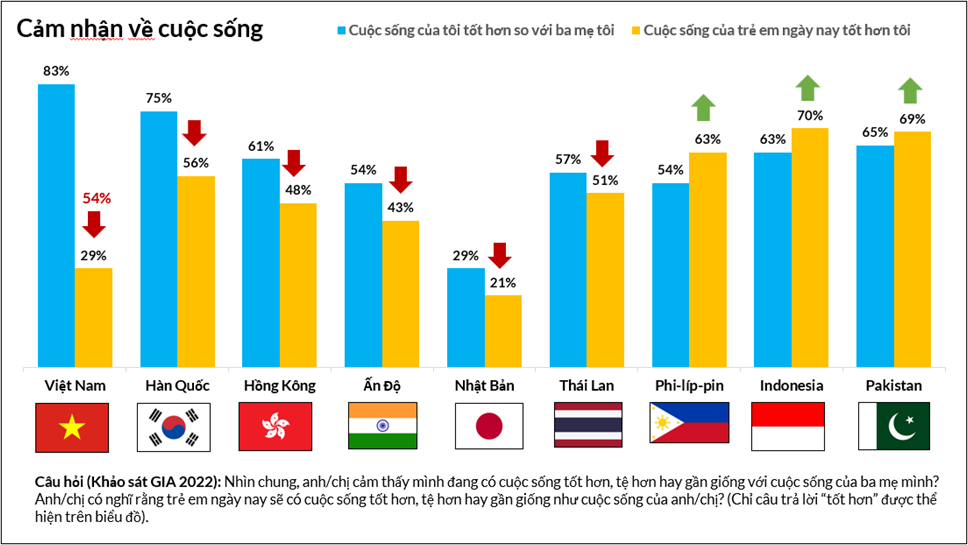
Nếu bạn quan tâm đến những nghiên cứu của chúng tôi, vui lòng truy cập https://indochina-research.com/news/https://indochina-research.com/news/
Để tham khảo thêm, vui lòng đọc:
- Khảo sát GIA (2022) là một cuộc thăm dò ý kiến toàn cầu do Hiệp hội quốc tế Gallup (GIA) thực hiện tại 64 quốc gia trong số 60,724 người tham gia từ tháng 8 đến tháng 10 năm 2022.
Please contact us for all your research projects in South East Asia
[email protected].
Indochina Research, Regional know-how you can trust!
The post Người Việt Nam nghĩ gì về cuộc sống hiện tại so với cuộc sống của cha mẹ mình ngày xưa? appeared first on Indochina Research.
]]>The post How do Vietnamese individuals perceive their own lives and the lives of their parents? appeared first on Indochina Research.
]]>Most Vietnamese think that they are living a better life compared to their parents’ lives.
According to the global survey conducted by Gallup International Association (GIA) 2022, one in two (51%) believes that their life is better than that of their parents. This could be interpreted as a positive outlook on their own circumstances compared to those of the previous generation.
Across regions, South Asia stands out with the highest proportion of individuals, at 60%, who believe that their life is better than that of their parents. Out of the South Asian countries and territories included in the survey, Vietnam emerges as the most optimistic, with 83% of its population selecting the option ‘better’. This is closely followed by the Republic of Korea (75%) and Pakistan (65%).
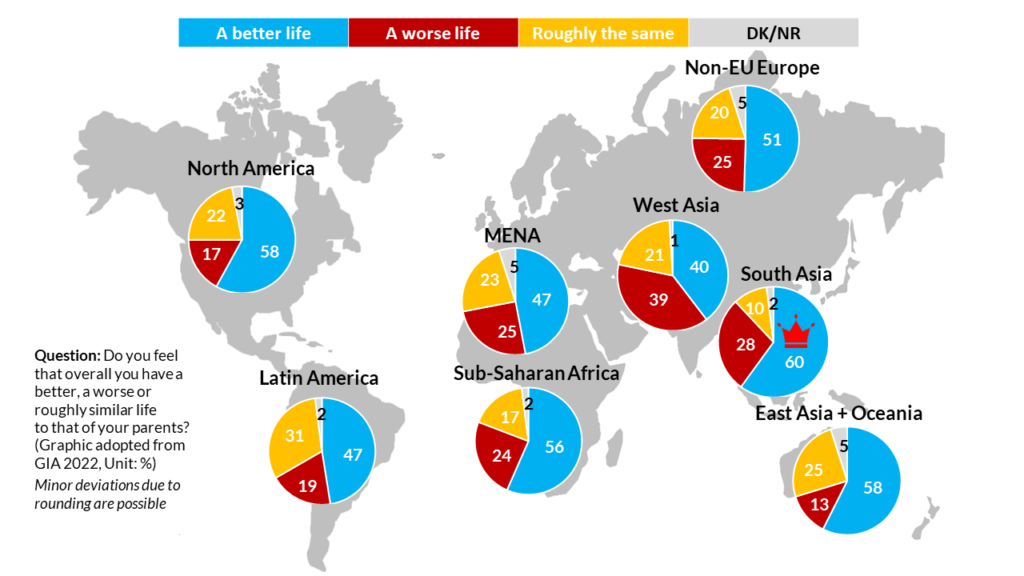
3 in 10 Vietnamese doubt that children will currently have a better life than they do.
Despite Vietnam’s top ranking (83%) in terms of satisfaction about their present lives, compared to their parents’ lives, among South Asian countries, they have doubts or uncertainties about the prospects and opportunities available to future generations. Only less than 3 in 10 (29%) Vietnamese respondents believe that their children’s lives will be better than their own, signifying a notable gap of 54 % points.
This less optimistic outlook regarding the future is also observed in other countries and territories in the region, though much less significantly, such as ROK (56%), Hong Kong (48%), India (43%), and Japan (21 %).
Interestingly, people from the Philippines (9% points), Indonesia (7% points) and Pakistan (4% points) consider the future to be brighter for their children that it is for them. This shows high optimism in the future or some actual difficulties that their countries’ population expect to be solved for the next generation.
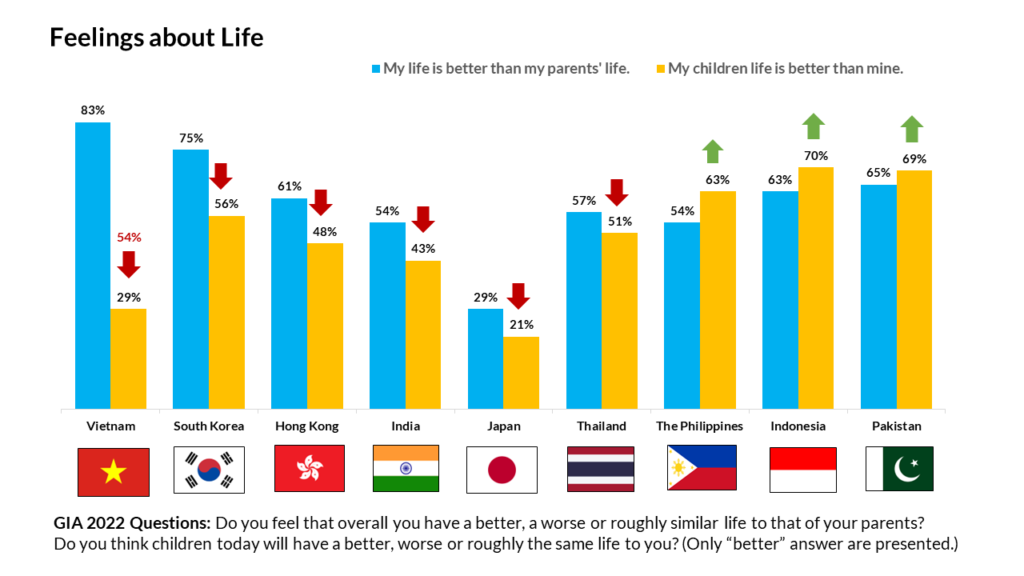
For any questions, feel free to contact us, or read our publications at https://indochina-research.com/news/
For further reference, please read:
- GIA survey (2022) is a global opinion poll conducted by Gallup International Association (GIA) in 64 countries (among 60,724 respondents) during August – October 2022.
Please contact us for all your research projects in South East Asia
[email protected].
Indochina Research, Regional know-how you can trust!
The post How do Vietnamese individuals perceive their own lives and the lives of their parents? appeared first on Indochina Research.
]]>The post Indochina Research Việt Nam & Điều tra Quốc gia về Sử dụng thời gian năm 2022 của Tổ chức Ngân hàng Thế giới appeared first on Indochina Research.
]]>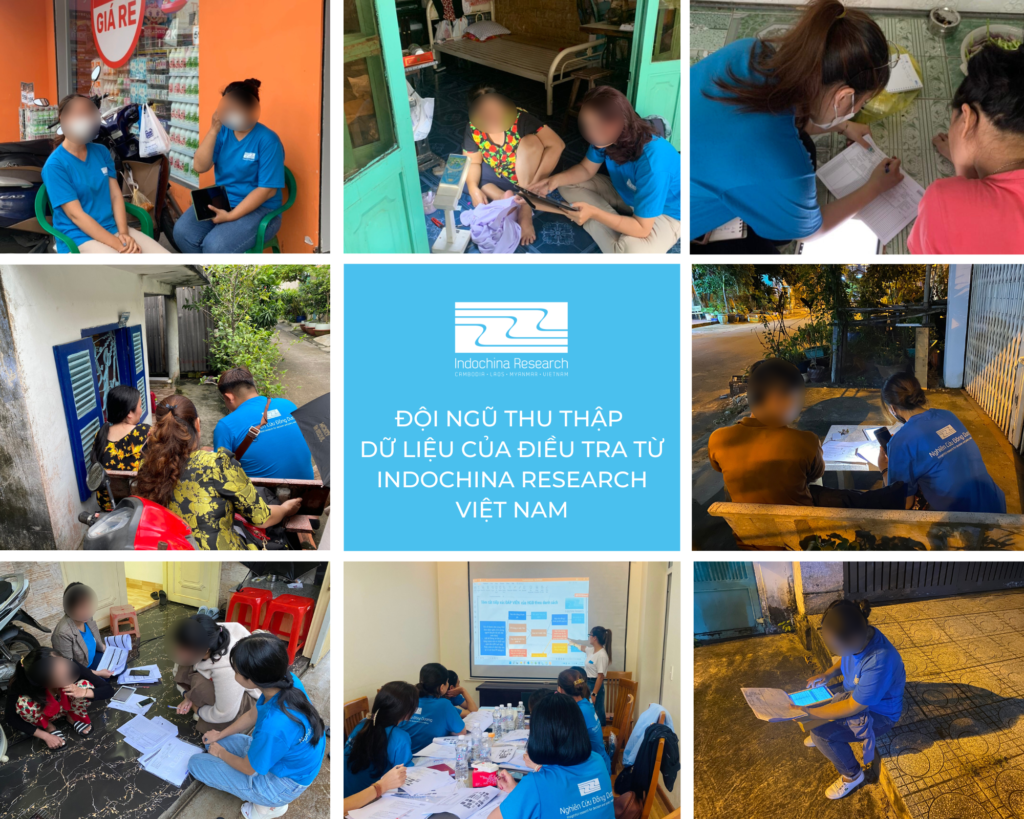
Phụ nữ dành thời gian cho những công việc không được trả lương gấp ba lần so với nam giới
Kết quả phỏng vấn 6.000 người trên toàn quốc cho thấy sự chênh lệch rõ rệt về việc phân bổ thời gian giữa công việc trả lương và công việc không được trả lương giữa nam và nữ.
- Phụ nữ làm việc nhiều giờ hơn nam giới, nhưng nam giới lại kiếm được nhiều tiền hơn bởi trung bình nam giới dành một giờ cho những công việc được trả lương còn phụ nữ phải dành ba giờ cho những công việc không được trả lương như nấu cơm, dọn dẹp, chăm sóc người già và trẻ nhỏ, v.v.
- Hầu hết nữ giới phải dành thời gian hàng ngày để làm việc nhà thì tỷ lệ này ở nam giới chỉ chiếm 55%.
- 45% nữ giới tham gia công việc chăm sóc gia đình, trong khi chỉ 24% nam giới thực hiện việc này.
- Do dành nhiều thời gian với các công việc trong gia đình, gần 1/3 phụ nữ không có thời gian giải trí trong ngày, trong khi nam giới dành nhiều hơn 1 giờ mỗi ngày so với phụ nữ cho việc chăm sóc cá nhân, ăn uống và ngủ nghỉ.
Indochina Research Việt Nam – Đội ngũ thu thập dữ liệu của Điều tra
Kết quả của cuộc khảo sát Điều tra Quốc gia về Sử dụng thời gian năm 2022 trở thành nền tảng để phân tích mối quan hệ giữa khoảng cách giới trong thời gian dành cho các “công việc không tên” và khoảng cách giới trong kết quả lao động của gia đình. Đồng thời, thông tin này sẽ giúp các nhà nghiên cứu và hoạch định chính sách trong việc xây dựng các khuyến nghị nhằm giải quyết những hạn chế về thời gian mà phụ nữ gặp phải, chẳng hạn như giảm gánh nặng của công việc chăm sóc không được trả lương, và cuối cùng là thúc đẩy bình đẳng giới ở Việt Nam bằng cách phát triển các dịch vụ mới liên quan đến chăm sóc trẻ em và chăm sóc người già.
Nếu bạn quan tâm đến những nghiên cứu của chúng tôi, vui lòng tham khảo tại: https://indochina-research.com/news/
Tài liệu tham khảo:
- Vietnam – Time-Use Survey 2022, truy cập tại https://microdata.worldbank.org/index.php/catalog/5844?fbclid=IwAR0VTUle0Bt9T_ide7wwXGGsHUoeOzXlZVy02FzU8ffElGMIzFseMetzNr8, vào ngày 02 tháng 06 năm 2023.
Please contact us for all your research projects in South East Asia
[email protected].
Indochina Research, Regional know-how you can trust!
The post Indochina Research Việt Nam & Điều tra Quốc gia về Sử dụng thời gian năm 2022 của Tổ chức Ngân hàng Thế giới appeared first on Indochina Research.
]]>The post Indochina Research Vietnam and Vietnam Time Use Survey 2022 by World Bank appeared first on Indochina Research.
]]>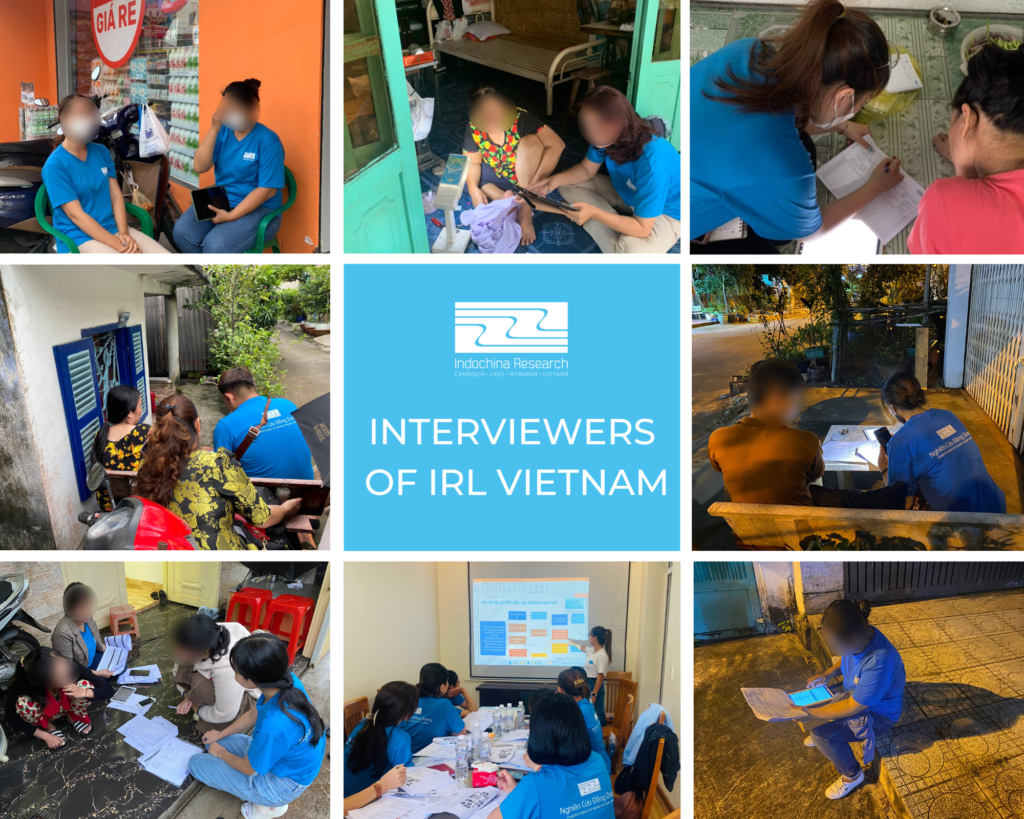
Women spend nearly three times more time on unpaid housework compared to men
The outcome revealed a notable contrast in the allocation of time between males and females in terms of both compensated and uncompensated tasks:
- Women work more hours, but men earn higher income. On average, men have one extra hour of paid work per day compared to women, while women dedicate nearly three additional hours to unpaid work such as cooking, cleaning, etc.
- Almost all women engage in daily housework, but only 55% of Vietnamese men do.
- Care work is predominantly carried out by women, with 45% of Vietnamese women taking on these responsibilities compared to 24% of men.
- Due to dedicating a substantial portion of their time to household chores, approximately one-third of women have limited time for personal care, eating, and sleeping on an average day. In contrast, men allocate nearly an additional hour per day compared to women for these activities.
Indochina Research Vietnam – Nationwide Data Collection Agency in Vietnam Time Use Survey
The findings of the survey and the public data will contribute to a better understanding of gender disparities by examining the time dedicated to paid and unpaid work, as well as the organization of household chores. This information will be valuable for researchers and policymakers in formulating recommendations to address time constraints faced by women, such as reducing the burden of unpaid care work, and ultimately, promote gender equality in Vietnam by developing new services related to childcare and elder care as example.
For any questions, feel free to contact us, or read our publications at https://indochina-research.com/news/
For further reference, please read:
- Vietnam – Time-Use Survey 2022, access at https://microdata.worldbank.org/index.php/catalog/5844?fbclid=IwAR0VTUle0Bt9T_ide7wwXGGsHUoeOzXlZVy02FzU8ffElGMIzFseMetzNr8, 02 June 2023.
Please contact us for all your research projects in South East Asia
[email protected].
Indochina Research, Regional know-how you can trust!
The post Indochina Research Vietnam and Vietnam Time Use Survey 2022 by World Bank appeared first on Indochina Research.
]]>The post Vietnam – The destination of happiness, low living expenses and opportunities appeared first on Indochina Research.
]]>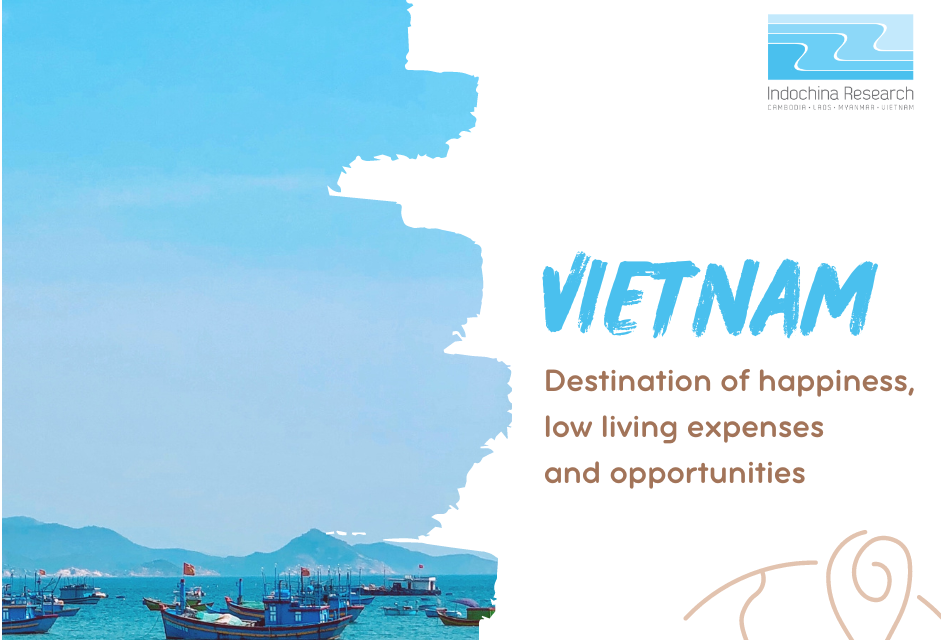
Vietnam – One of the preferred countries by Vietnamese and expats
According to the global opinion poll conducted by Gallup International Association (GIA) members and partners, when asked about a preferred place to live, 4 out of 10 people (36%) globally would be willing to migrate to another country, and 6 out of 10 would prefer staying in their own country. The preference for moving abroad is significantly higher in low-income economies, at 62% in average. Countries where the population is more inclined to “escape” are Sierra Leone (84%), Ghana (81%) and Nigeria (71%).
On the other hand, Vietnam is the country where the desire to stay is the highest (91%), followed by India (82%) and Pakistan (78%). The closest Asian countries are Indonesia (73%) and Japan (71%). This indicates that Vietnam is a preferable living for most of its residents.
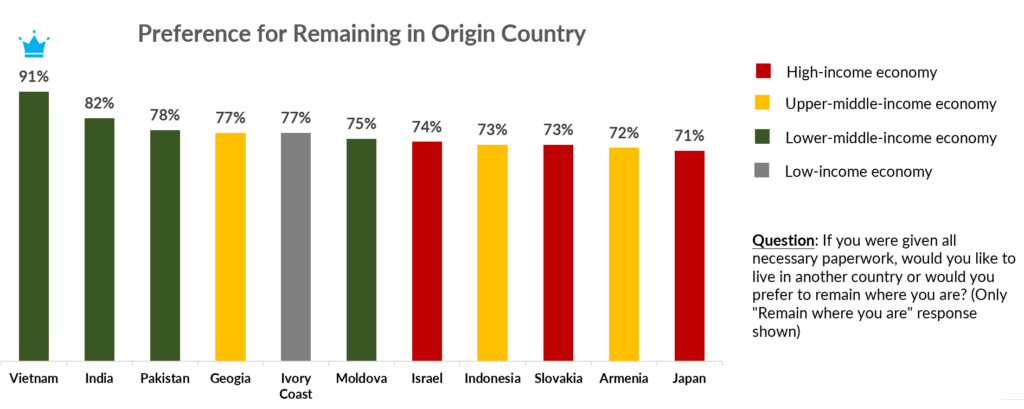
Not only Vietnamese but also many foreigners think Vietnam is one of the ideal destinations to live and work. A survey by InterNations (2022) asserted that Vietnam was among the top 10 best destination for expats with 84% of them being satisfied with their lives in Vietnam. The welcoming and cordial nature of the local population is a distinct characteristic that contributes to the comfort of foreigners residing in Vietnam. Besides, Vietnam is regarded as the top nation globally concerning personal finance, with 80% of respondents expressing contentment with the cost of living here. People opt for Vietnam as it provides them with the chance to enhance their skills, boost their earnings, and secure a stable yet vibrant lifestyle.
Happiness Index in Vietnam is slightly up year after years
Besides being a favoured location for residence, Vietnam shows a significant improvements in its Happiness Index, but not yet recovering to the pre-Covid time
Indochina Research Ltd. Vietnam have conducted the tracking End of Year surveys to measure the Happiness Index of Vietnamese since 2017 (except 2018). Over the last 6-years, Vietnam’s Happiness Index has plunged down to the lowest point of 61% in 2020 from a relatively high position of 78% in 2017. Most recently (Q4 2022), 7 in 10 urban Vietnamese (70%) reported feeling happy or very happy with their lives, marking an upward trend since the onset of the COVID pandemic.
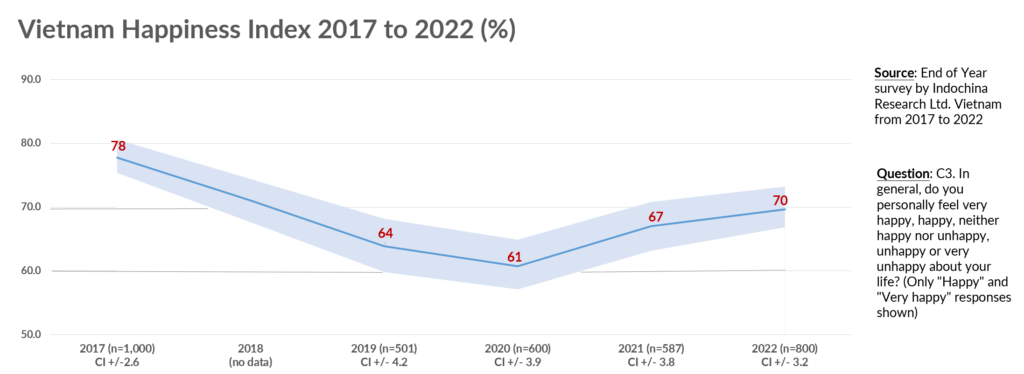
3 out of 10 urban Vietnamese respondents live comfortably
While money doesn’t necessarily equate to happiness directly, it can be perceived to contribute to happiness. In recent months, the cost of living has increased due to various factors, including COVID-19, political and economic crises affecting many countries. As results, people have been facing financial difficulties and struggles. Globally, only 1 out of 4 global respondents (25%) declared living comfortably, while 36% declare struggling financially.
Our annual WIN World Survey 2022 showed that 3 in 10 (30%) urban Vietnamese reported living a comfortable life, whereas 55% find themselves in a moderate scenario where they are neither living comfortably nor experiencing hardship. Among APAC countries, Vietnam ranks first with the highest percentage of population (85%) living above the struggling threshold, with only 14 % reporting struggling financially.
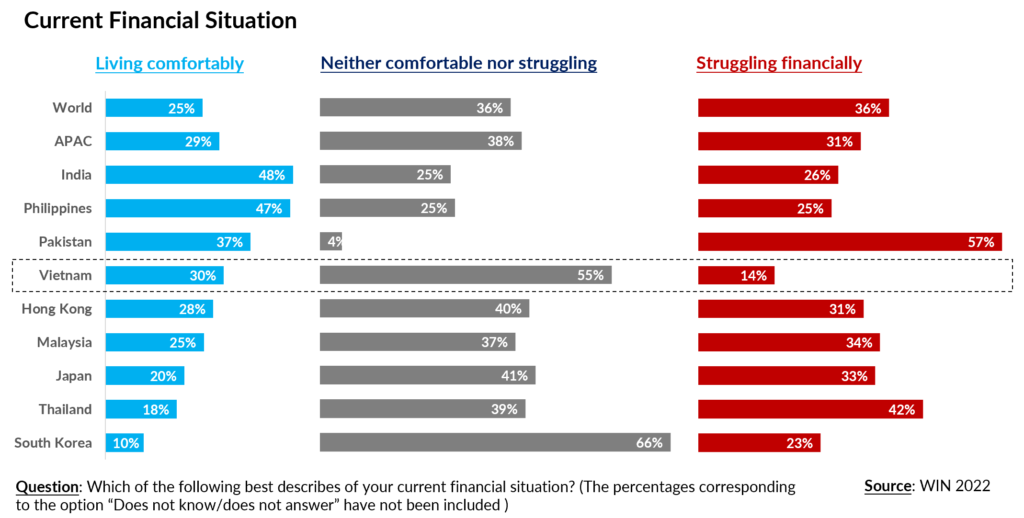
For any questions, feel free to contact us, or read our publications at https://indochina-research.com/news/
For further reference, please read:
- WIN Survey (2022) WWS 2022 explored the views and beliefs of 29,739 individuals from 36 countries around the world.
- GIA survey (2022) is a global opinion poll conducted by Gallup International Association (GIA) in 57 countries among 54,329 respondentsfrom Aug to Oct 2022.
- InterNations (2022) “Expat City Ranking 2022 Reveals Best & Worst Cities for Expats around the World”, InterNations, 29 November, access at https://www.internations.org/press/press-release/expat-city-ranking-2022-reveals-best-worst-cities-for-expats-around-the-world-40337#:~:text=About%20the%20Expat%20City%20Ranking%202022&text=For%20the%20survey%2C%20InterNations%20asked,gender%2C%20age%2C%20and%20nationality, 26 May 2023.
- World Happiness Report (2023) World Happiness Report 2023, accessed at https://worldhappiness.report/, 26 May 2023.
Please contact us for all your research projects in South East Asia
[email protected].
Indochina Research, Regional know-how you can trust!
The post Vietnam – The destination of happiness, low living expenses and opportunities appeared first on Indochina Research.
]]>The post Điểm đến của hạnh phúc, mức sống vừa phải và những cơ hội appeared first on Indochina Research.
]]>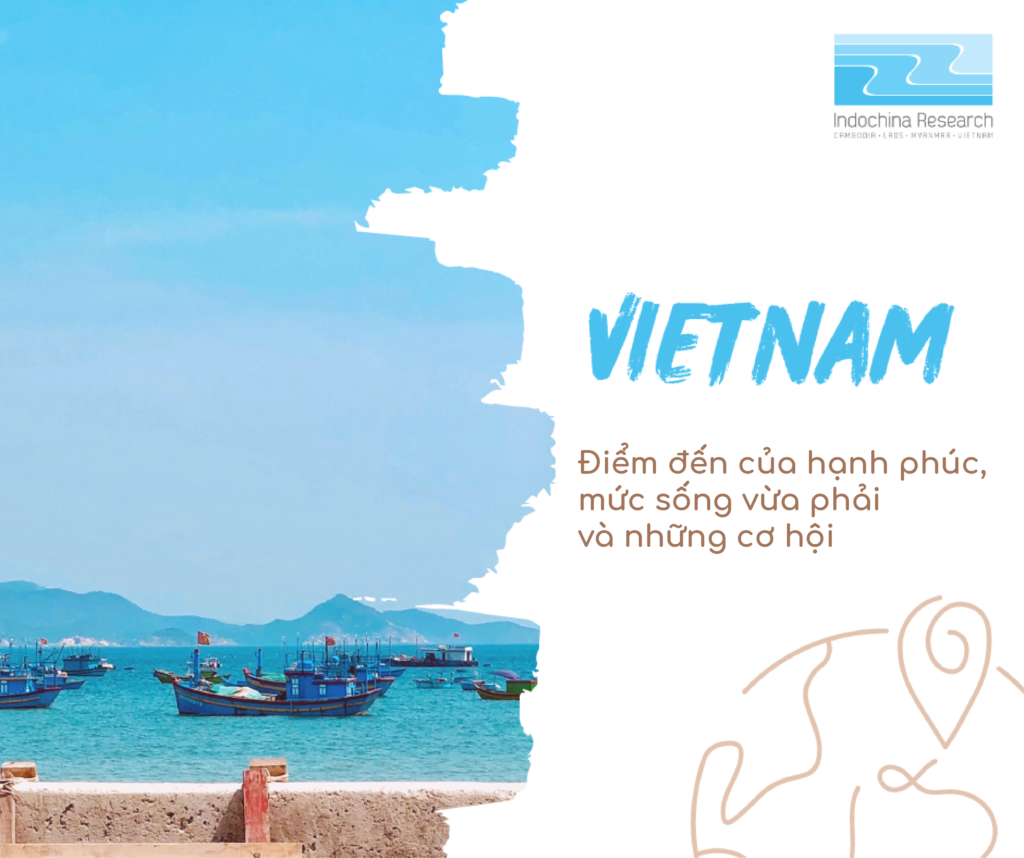
Việt Nam – đất nước được yêu mến bởi người Việt và người nước ngoài
Theo kết quà thăm dò dư luận toàn cầu được thực hiện bởi Hiệp hội Quốc tế Gallup International (GIA), khi hỏi về một địa điểm tuyệt vời để sinh sống, cứ 10 người thì có 4 người (36%) sẵn sàng di cư đến một quốc gia khác, trong khi 6/10 người được hỏi thì chọn sống tại quê hương của mình. Sở thích di chuyển ra nước ngoài sinh sống đang chiếm ưu thế đáng kể tại các quốc gia có nền kinh tế ở mức trung bình 62%, đặc biệt là ở Sierra Leone (84%), Ghana (81%) và Nigeria (71%).
Ngược lại, trong nhóm những người có xu hướng ở lại quê hương của mình, người Việt Nam có mong muốn sinh sống tại quê hương cao nhất (91%), tiếp theo là người Ấn Độ (82%) và người Pakistan (78%). 73% được ghi nhận tại Indonesia và 71% tại Nhật Bản cũng lựa chọn việc sống tại quốc gia của họ. Như vậy, điều này cho thấy Việt Nam là một địa điểm đáng sống đối với hầu hết dân cư nước này.
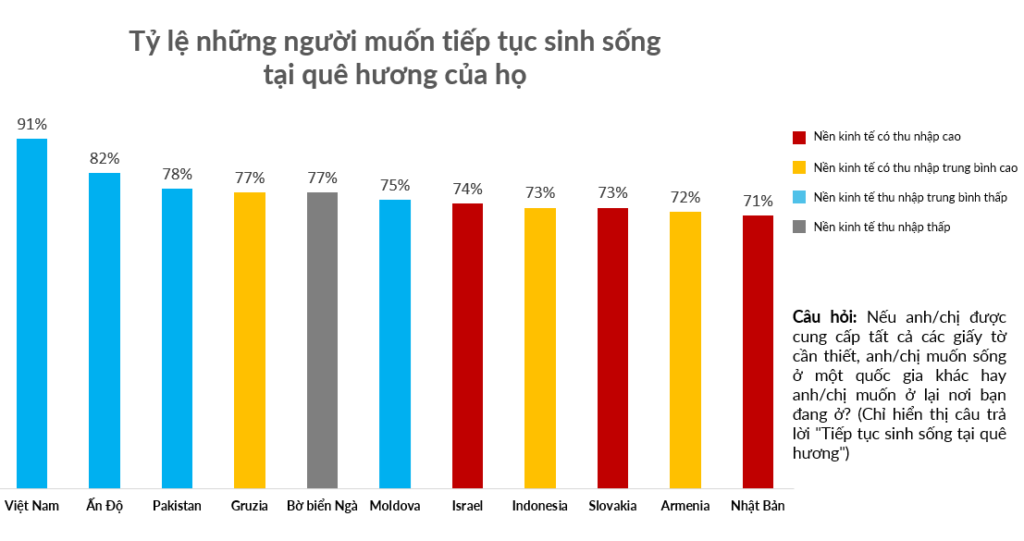
Không chỉ người Việt Nam mà rất nhiều người nước ngoài nghĩ rằng Việt Nam là một trong những điểm đến lý tưởng để sống và làm việc đối với họ. Một cuộc khảo sát được thực hiện bởi InterNations năm 2022 khẳng định rằng Việt Nam nằm trong top 10 những điểm đến mà người nước ngoài lựa chọn, có 84% người ngoại quốc hài lòng với cuộc sống của họ tại Việt Nam. Sự chào đón nồng nhiệt và thân thiện của người dân địa phương chính là yếu tố góp phần tạo dựng sự thoải mái cho người nước ngoài cư trú tại Việt Nam. Bên cạnh đó, Việt Nam là một trong những quốc gia hàng đầu trên toàn cầu quan tâm tài chính cá nhân, với 80% người được hỏi bày tỏ sự hài lòng với chi phí sinh hoạt ở đây. Mọi người chọn Việt Nam là bởi nơi này mang đến cho họ cơ hội nâng cao kỹ năng, tăng thu nhập và đảm bảo một cuộc sống ổn định.
Chỉ số hạnh phúc của Việt Nam đang có xu hướng tăng lên đáng kể
Bên cạnh vị trí địa lý thuận lợi để định cư, Việt Nam cho thấy sự cải thiện đáng kể về Chỉ số Hạnh phúc, nhưng chưa phục hồi bằng thời kỳ trước đại dịch Covid.
Indochina Research Ltd. Việt Nam đã tiến hành theo dõi Khảo sát End of Year để đo lường Chỉ số Hạnh phúc của người Việt Nam kể từ năm 2017 (trừ năm 2018). Trong 6 năm qua, Chỉ số Hạnh phúc của Việt Nam đã giảm xuống mức thấp nhất là 61% vào năm 2020 từ mức tương đối cao là 78% vào năm 2017. Gần đây nhất (Quý 4 năm 2022), cứ 10 người ở thành thị Việt Nam thì có 7 người (70%) cho biết rằng họ cảm thấy hạnh phúc hoặc rất hài lòng với cuộc sống của họ, đánh dấu một xu hướng tăng lên kể của Chỉ số Hạnh phúc từ khi bắt đầu đại dịch COVID.
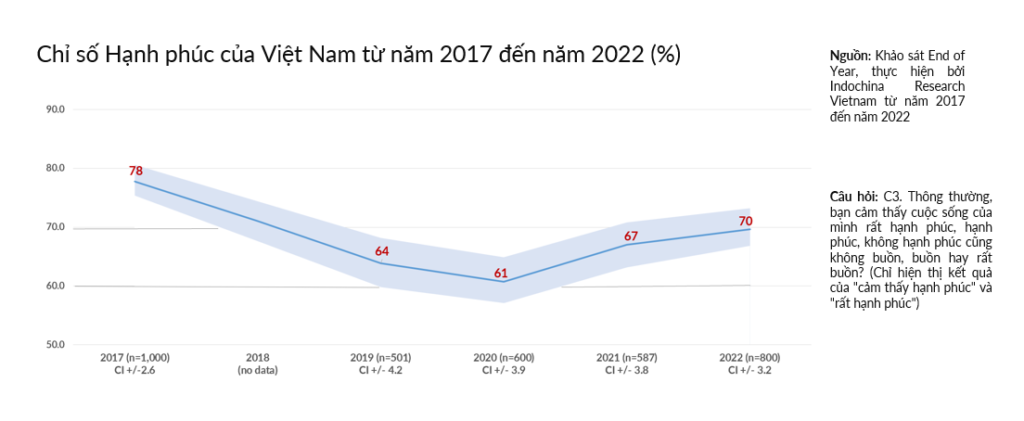
Cứ 10 người thì có 3 người Việt Nam cho rằng họ có cuộc sống thoải mái
Mặc dù tiền không ảnh hưởng trực tiếp hạnh phúc, nhưng nó có thể được coi là góp phần tạo nên hạnh phúc. Trong những tháng gần đây, chi phí sinh hoạt đã tăng lên do nhiều yếu tố, do COVID-19, các cuộc khủng hoảng kinh tế và chính trị ảnh hưởng đến nhiều quốc gia. Kết quả là, mọi người đã phải đối mặt với những khó khăn và vật lộn về tài chính. Trên toàn cầu, chỉ 1 trong số 4 người được hỏi toàn cầu (25%) tuyên bố đang sống thoải mái, trong khi 36% tuyên bố đang gặp khó khăn về tài chính.
Khảo sát WIN World 2022 hàng năm cho thấy cứ 10 người Việt Nam ở thành thị thì có 3 người (30%) cho biết họ có cuộc sống thoải mái, trong khi 55% thấy mình đang sống một cuộc sống vừa phải, không quá thoải mái nhưng cũng không gặp khó khăn. Trong số các quốc gia APAC, Việt Nam đứng đầu với tỷ lệ dân số không sống khó khăn cao nhất (85%) , chỉ có 14% cho biết đang gặp khó khăn về tài chính.
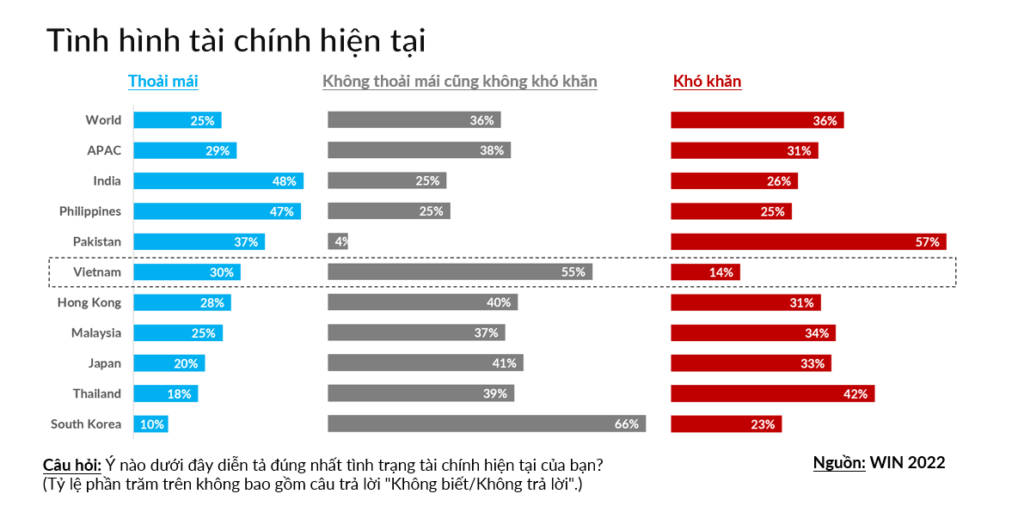
Nếu bạn quan tâm đến những nghiên cứu của chúng tôi, vui lòng truy cập https://indochina-research.com/news/
Để tham khảo thêm, vui lòng đọc:
- Khảo sát WIN (2022) WWS 2022 thu thập quan điểm và niềm tin của 29.739 cá nhân từ 36 quốc gia trên thế giới.
- Khảo sát GIA (2022) là một cuộc thăm dò ý kiến toàn cầu do Hiệp hội quốc tế Gallup (GIA) thực hiện tại 57 quốc gia trong số 54.329 người được hỏi từ tháng 8 đến tháng 10 năm 2022.
- InterNations (2022) “Xếp hạng thành phố dành cho người nước ngoài năm 2022 tiết lộ những thành phố tốt nhất và tồi tệ nhất dành cho người nước ngoài trên khắp thế giới”, InterNations, ngày 29 tháng 11, truy cập tại https://www.internations.org/press/press-release/expat-city-ranking-2022-reveals-best-worst-cities-for-expats-around-the-world-40337#:~:text=About%20the%20Expat%20City%20Ranking%202022&text=For%20the%20survey%2C%20InterNations%20asked,gender%2C%20age%2C%20and%20nationality, 26 May 2023.
- Báo cáo Hạnh phúc Thế giới (2023) Báo cáo Hạnh phúc Thế giới 2023, truy cập tại https://worldhappiness.report/, ngày 26 tháng 5 năm 2023.
Please contact us for all your research projects in South East Asia
[email protected].
Indochina Research, Regional know-how you can trust!
The post Điểm đến của hạnh phúc, mức sống vừa phải và những cơ hội appeared first on Indochina Research.
]]>The post Do you know what happens with your personal information after collected? appeared first on Indochina Research.
]]>
Data Privacy Awareness and Understanding
According to the global survey conducted for WIN Market Research partners in December 2022, 59% of polled Vietnamese declared to have been aware of what happened with their personal information after they shared it with data collectors. This figure is the outcome of a steady upward trend, representing a total increase of 33% points over the four-year period (from 2019 to 2022), which might be thanks to the increased transparency from data collectors and the overall more knowledgeable population.
In general, the awareness and understanding about privacy among Vietnamese people is higher than the in APAC region (35 %), the world average (35% ) and most of APAC countries. Interestingly, APAC countries/territories, with the lowest level of self-declared awareness and understanding about data usage and privacy, are the world largest economies, such as Hong Kong (China), South Korea and Japan . Despite such a high rank among the surveyed countries, about 4 out of 10 Vietnamese remain ignorant about how, why, and where their data is stored, processed, and potentially shared, which emphasizes the need for improved communication and responsibility from data collectors.
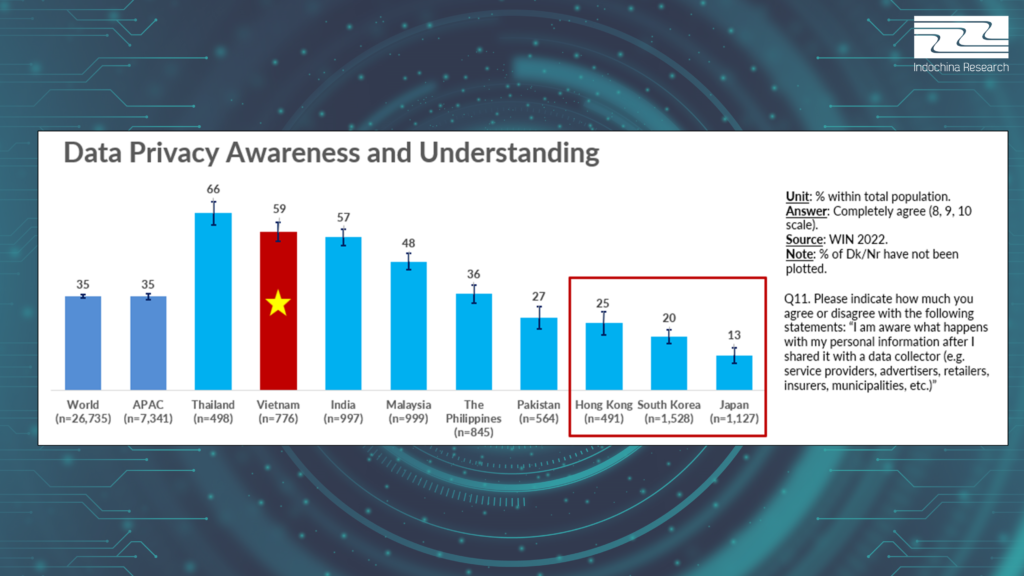
Vietnam’s data protection regulations and ESOMAR standards
As a market research agency, Indochina Research Vietnam (IRL) is committed to ensure the privacy and data security of our research respondents/participants, and take actions to protect the collected data with strict compliance to Vietnam’s data protection regulations and ESOMAR (European Society for Market Research) standards. See more about how we protect privacy and data protection as below:
- Research objectives and data usage are made clear to data subjects (“respondents/participants”) prior to data collection and their consent to participate obtained.
- Personal data are not disclosed to any third party unless the data subject has given consent to do so.
- A privacy notice is readily accessible by data subjects and is easily understood.
- Personal data cannot be traced, nor inferred via deductive disclosure to the survey responses
- Personal data is held securely. It is protected against risks such as loss, unauthorised access, destruction, misuse, manipulation, or disclosure.
- Personal data is to be held no longer than is necessary for the purpose of which it was collected or used.
Clear data protection and privacy communication enable market researchers to build trust with clients, respondents, and stakeholders, ensure regulatory compliance; mitigate risk of data breaches and the subsequent reputational damage; ensure transparency to respondents/participants and increase the quality of data collected.
For any questions, feel free to contact us, or read our publications at https://indochina-research.com/news/
For further reference, please read:
- 2022 WIN World Survey (WWS) on Technology topic (link)
- Vietnam regulation : Degree No. 13/2023/ND-CP on Protection of Personal Data by the Government of Vietnam (link)
- ICC/ESOMAR International Code on Market, Opinion and Social Research and Data Analytics (link)
Please contact us for all your research projects in South East Asia
[email protected].
Indochina Research, Regional know-how you can trust!
The post Do you know what happens with your personal information after collected? appeared first on Indochina Research.
]]>The post Thông tin cá nhân của bạn sau khi được thu thập sẽ được xử lý thế nào? appeared first on Indochina Research.
]]>
Nhận thức và hiểu biết về Quyền riêng tư dữ liệu
Theo kết quả khảo sát đa quốc gia của Hợp tác quốc tế của các Công ty Nghiên cứu thị trường và Thăm dò độc lập WIN vào tháng 12/2022 cho thấy 59% người Việt Nam được hỏi cho biết rằng họ biết những gì xảy ra với thông tin cá nhân của họ sau khi chia sẻ thông tin với bên thu thập dữ liệu. Mức độ nhận thức này tăng dần đều qua các năm từ mức 26% của năm 2019 (WIN, 2022). Đây là kết quả của nỗ lực minh bạch hóa việc thu thập và sử dụng dữ liệu của các đơn vị thu thập dữ liệu và của mặt bằng dân trí ngày càng nâng cao.
- Nhìn chung, mức độ nhận thức và hiểu biết về quyền riêng tư của người Việt Nam cao hơn tỉ lệ trung bình của khu vực Châu Á – Thái Bình Dương (APAC) (35 %), và toàn cầu (35%) và hầu hết các nước trong khu vực Châu Á – Thái Bình Dương.
- Điều thú vị là các quốc gia/vùng lãnh thổ có độ nhận thức và hiểu biết thấp nhất trong khu vực lại là những nền kinh tế lớn nhất thế giới như Hồng Kông (Trung Quốc), Hàn Quốc và Nhật Bản.
- Mặc dù được xếp hạng cao trong số các quốc gia được khảo sát nhưng cứ 10 người Việt Nam thì có khoảng 4 người không biết dữ liệu của họ được lưu trữ, xử lý và chia sẻ như thế nào. Điều này cho thấy các đơn vị thu thập dữ liệu cần có trách nhiệm hơn trong việc giải thích rõ ràng với đối tượng nghiên cứu về quyền riêng tư và tuân thủ các quy định về an toàn dữ liệu.

Quy định về an toàn dữ liệu của Việt Nam và tiêu chuẩn ESOMAR
Là một công ty nghiên cứu thị trường, IRL Việt Nam cam kết đảm bảo quyền riêng tư và bảo mật dữ liệu cho đối tượng nghiên cứu bằng cách thực hiện các biện pháp bảo vệ thông tin theo quy định về an toàn dữ liệu của Việt Nam và tiêu chuẩn ESOMAR (Hiệp hội Nghiên cứu Thị trường Châu Âu). Xem thêm cách thức chúng tôi bảo vệ quyền riêng tư và an toàn dữ liệu như sau:
- Mục tiêu nghiên cứu và việc sử dụng dữ liệu được làm rõ cho các chủ thể dữ liệu (“người trả lời/người tham gia”) trước khi thu thập dữ liệu và nhận được sự đồng ý tham gia của họ.
- Dữ liệu cá nhân không được tiết lộ cho bất kỳ bên thứ ba nào trừ khi chủ thể dữ liệu đồng ý.
- Chủ thể dữ liệu có thể dễ dàng truy cập và hiểu được thông báo về quyền riêng tư.
- Dữ liệu cá nhân không thể được truy tìm, cũng như không thể suy luận thông qua tiết lộ suy diễn đối với các câu trả lời khảo sát
- Dữ liệu cá nhân phải được lưu giữ an toàn và bảo vệ khỏi các rủi ro như mất mát, truy cập trái phép, phá hủy, lạm dụng, thao túng hoặc tiết lộ.
- Dữ liệu cá nhân không được lưu trữgiữ lâu hơn mức cần thiết cho mục đích mà dữ liệu được thu thập hoặc sử dụng.
Việc bảo vệ dữ liệu và quyền riêng tư về thông tin liên lạc minh bạch cho phép các nhà nghiên cứu thị trường xây dựng niềm tin với khách hàng, đáp viên và các bên liên quan, đảm bảo tuân thủ quy định; giảm thiểu rủi ro vi phạm dữ liệu và thiệt hại về uy tín sau đó; đảm bảo tính minh bạch đối với đáp viên/người tham gia và nâng cao chất lượng dữ liệu thu thập được.
Nếu có bất kỳ câu hỏi nào, vui lòng liên hệ với chúng tôi qua Facebook, LinkedIn hoặc [email protected]
Để tham khảo thêm, vui lòng đọc:
- Khảo sát thế giới WIN 2022 (WWS) về chủ đề Công nghệ (link)
- Quy định của Việt Nam : Nghị định số 13/2023/NĐ-CP về Bảo vệ Dữ liệu Cá nhân của Chính phủ Việt Nam (link)
- Bộ luật Quốc tế ICC/ESOMAR về Nghiên cứu Thị trường, Quan điểm và Xã hội và Phân tích Dữ liệu (link)
Please contact us for all your research projects in South East Asia
[email protected].
Indochina Research, Regional know-how you can trust!
The post Thông tin cá nhân của bạn sau khi được thu thập sẽ được xử lý thế nào? appeared first on Indochina Research.
]]>The post Research Knowledge about Online Survey appeared first on Indochina Research.
]]>Market research is the fact of gathering, analysing and interpreting information about individual needs and preferences. It is both a science and an art to help businesses and institutions better understand their targeted populations and to make informed decisions about the demand and viability of a new service, programme, or product. As among the longest standing market research agency in Vietnam, Indochina Research (IRL) Vietnam has provided research services to support clients from various sectors and industries to capture the perceptions and interests of Vietnamese people.
Online Survey Prospect in Vietnam
With the current growing preference for online surveys due to it perceived fast turn-around and cost-effectiveness, there raises both challenges and opportunities to ensure data quality and validity. One of IRL Vietnam action is to explore the behaviour of online respondents. In a large-scaled face-to-face nationwide Population survey of 4,747 samples in 2022, we asked whether they had ever completed any online survey before, and results shows that only a small proportion (2.7%) had done so, significantly skewed to younger generations (93%). This indicates that although the overall internet penetration rate in Vietnam was approximately 74% (World Bank, 2021)[1] but the reach and coverage level of online survey methodology remain limited.
[1] World Bank (2021) ” Individuals using the Internet (% of population) – Vietnam”, The World Bank Data Portal, accessed at https://data.worldbank.org/indicator/IT.NET.USER.ZS?locations=VN, 01 May 2023.

Besides the low reach, the skewedness[1] towards younger generations of Gen Y (47%) and Gen Z (46%) could lead to a potential bias in the data collected through online surveys, as the perspectives and experiences of older age groups may be underrepresented. For example, the population of over 59 years old (Boomers) are invisible in our experiment.
Another bias also observed with urbanity ratio when the online survey ratio is 48% vs urban: 52% rural while the actual ratio is 35 : 65% (GSO, 2019)[2].
[1] Small sample size
[2] GSO (2019) “Công bố kết quả Tổng điều tra dân số 2019”, GSO Online Data Portal, 13 July, accessed at https://datacollection.gso.gov.vn/dieutralaodongvieclam/cong-bo-ket-qua-tong-dieu-tra-dan-so-2019, 01 May 2023.
Thus, researchers need to take into account this reality when commissioning online research, and consider other modes, such as Face to Face (CAPI), Telephone (CATI), or mix-method, when collecting data in Vietnam, to ensure reaching a representative sample of the population.
Online Survey Behaviour – 4 out of 10 do not fully read all questions and answers
In this experiment, we also asked respondents with previous experience in online survey (n=131) about their survey behaviour. Survey behaviour refers to the actions, attitudes, and responses of individuals when an individual participates in a survey or answer a questionnaire.
We wanted to measure levels of satisficing behaviour, to understand if online respondents were likely to provide quick, satisfactory answers rather than taking the time to carefully consider each question, like it would be done when assisted by an interviewer. Our questionnaire described different levels of decision-making effort and the extent to which individuals were willing to settle for a less-than-optimal answer, with 4 codes accordingly to the three categories of satisficing behaviour, as specified in the Table below, including Optimal answers, weak Satisficing, Strong satisficing.
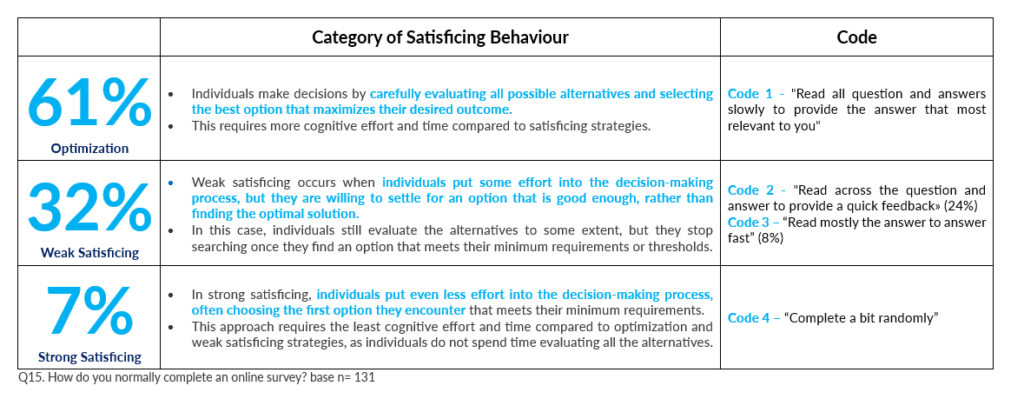
It is reported that 6 in 10 (61%) respondents self-declared that they carefully evaluated all possible alternatives and selected the most applicable one while 32% stated that they asserted less level of effort when completing the questionnaire when scanning through the answers quickly and settling for an option that is good enough. It is worth noting that 7% confessed that they randomly choose the answers, which would greatly impact the quality of the data.
Understanding the different levels of satisficing behaviour can help design surveys (collection method and questionnaire) that minimize the impact on data quality. Different techniques such as randomizing response options, reducing survey length, and simplifying question wording, should be employed to encourage respondents to put more effort into their answers and reduce the likelihood of satisficing. Other strategies to ensure the quality of your survey data and improve the reliability and accuracy of findings are conducting face-to-face survey pilots to observe respondents behaviour and get feedbacks on unclear questions, improve language, or adapt question types.
Concluding Remarks
There is potential for online surveys to become more popular in Vietnam, however, it is important to recognise and critically evaluate the limitations and potential biases of this method, including:
- Coverage bias: Online surveys can only reach people who have access and are willing to answer survey via internet, which results in data bias and the exclusion of some rural, or marginalised, vulnerable, populations.
- Self-selection bias: Online surveys rely on people voluntarily choosing to participate which can lead to self-selection bias and skew the results to population looking for rewards (incentive) in compensation.
- Sampling bias: Even with efforts to make the survey representative of the population, there may still be sampling bias in the data. This means that the sample of people who participate in the survey may not accurately reflect the larger population (in geographic area for instance), which can lead to inaccurate conclusions being drawn.
- Response bias: People may respond differently to questions depending on the mode of survey administration, which can lead to response bias. For example, people may be more likely to give kind of opposite views in an online survey than they would be in a face-to-face interviews.
Furthermore, it is also challenging for online surveys to address geographic legal, ethical, and practical considerations and control sample quality. To know more about online survey and quality aspects, we are happy to share the ESOMAR 5European Society for Opinion and Market Research), guidelines as below.
Overall, while online surveys can be a valuable tool, it is important to consider their limitations and potential biases when commissioning such research and interpreting the results. Combining online surveys with other modes of data collection, such as F2F CAPI or CATI, can help to mitigate some of these weaknesses and provide a more complete picture of the population.
Please contact us for all your research projects in South East Asia
[email protected].
Indochina Research, Regional know-how you can trust!
The post Research Knowledge about Online Survey appeared first on Indochina Research.
]]>The post Ngày Trái Đất 2023: Doanh nghiệp chọn kinh doanh ‘xanh’ để thu hút giới trẻ appeared first on Indochina Research.
]]>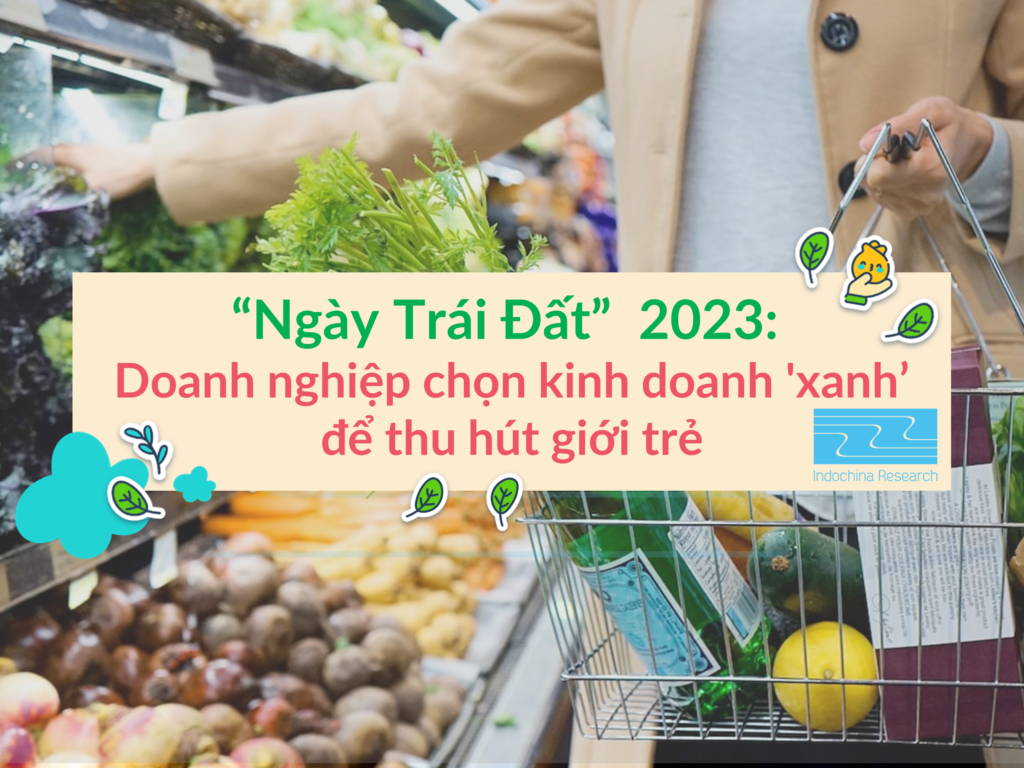
Tính bền vững quan trọng với người tiêu dùng như thế nào?
Biến đổi khí hậu (93%) và những vấn đề môi trường, đặc biệt là ô nhiễm không khí (93%), là những mối bận tâm hàng đầu của giới trẻ Việt Nam trong độ tuổi từ 18 đến 29. Trong bối cảnh đó, thế hệ trẻ tiên phong lựa chọn “sống xanh” qua lối sống và hành vi tiêu dùng của mình với niềm tin rằng sự thay đổi đó sẽ có tác động tích cực đến môi trường.
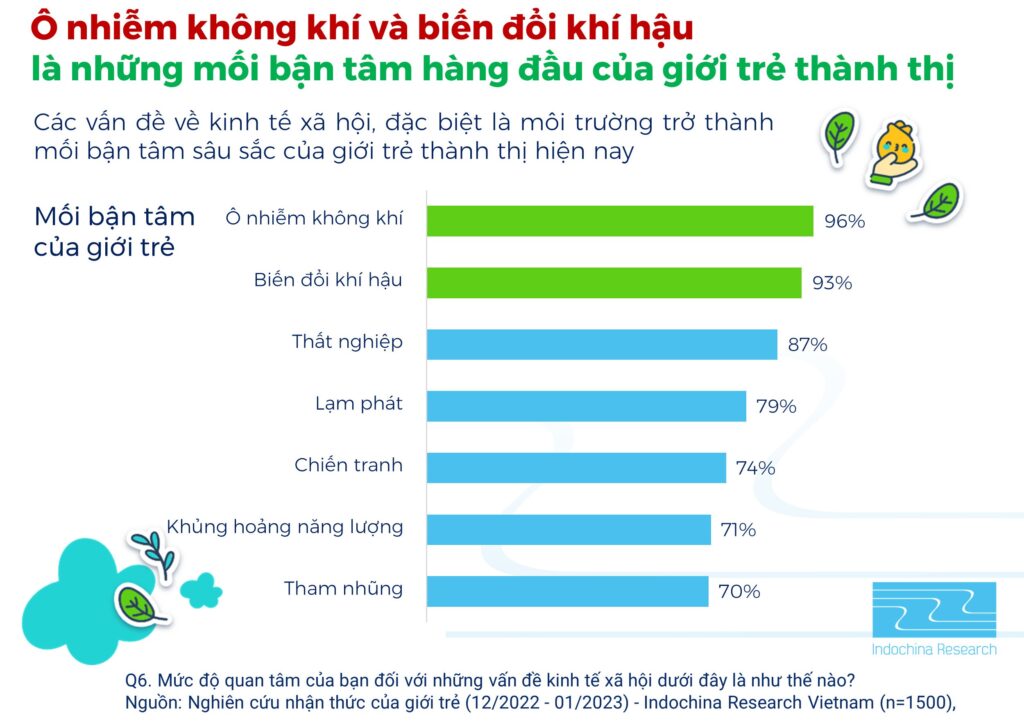
7 trong 10 người trẻ được phỏng vấn khẳng định rằng họ sẽ ít có khả năng mua các sản phẩm của các thương hiệu bị cáo buộc vi phạm các quy định về môi trường. Cứ 10 người thì có 9 người dự tính sẽ mua hàng từ các công ty có sản phẩm “xanh” hoặc có hành động giảm thiểu tác động đến môi trường. Ngoài ra, 30% khẳng định rằng những chiến dịch trách nhiệm xã hội của doanh nghiệp (CSR) có ảnh hưởng đến quyết định mua hàng của họ.
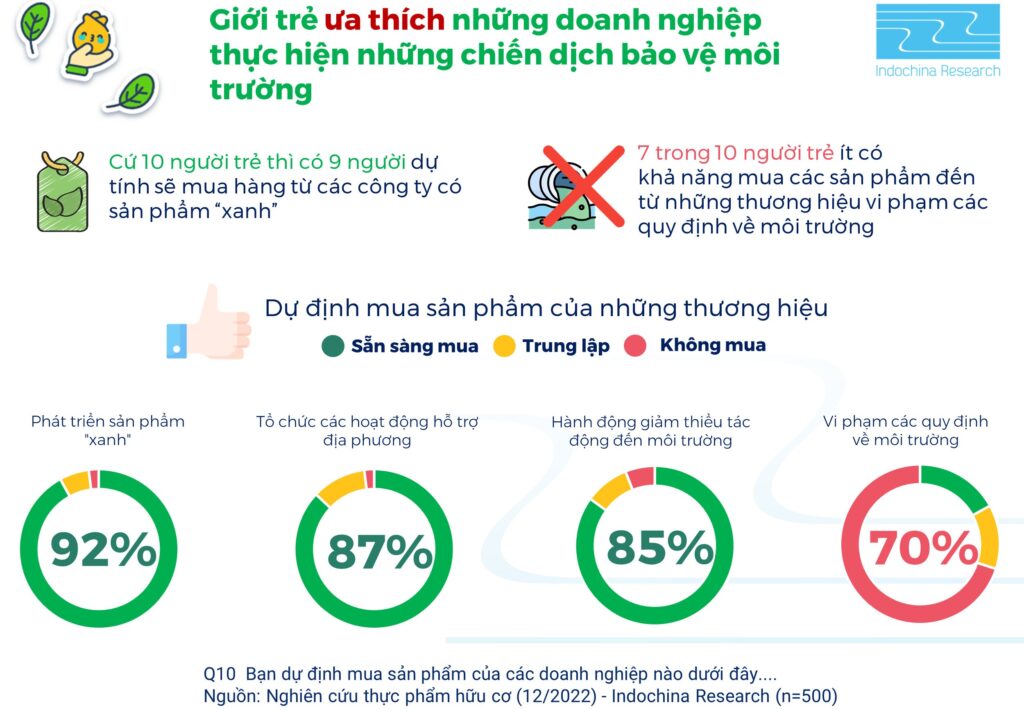
Bên cạnh việc ưa chuộng những sản phẩm thân thiện với môi trường, người trẻ cũng mong muốn rằng các tập đoàn xuyên quốc gia cũng thực hiện mọt cách nghiêm túc các chiến dịch CSR thay vì sử dụng hình thức này như một công cụ tiếp thị hay quản lý nhận sự đơn thuần.
Điều gì đang thúc đẩy giới trẻ tập trung vào việc tiêu dùng bền vững?
Một trong những động lực hướng đến sự bền vững có thể bắt đầu việc người Việt Nam ngày càng quan tâm đến sức khỏe và dinh dưỡng. Trong 1 khảo sát của Indochina Research Vietnam với 500 người Việt Nam có thu nhập hộ gia đình hàng tháng trên 15 triệu cho biết cứ 10 người thì có khoảng 3 người đã mua thực phẩm hữu cơ trước đó. Đặc biệt, 50% những người đưa ra ý kiến này là thanh niên, điều này cho thấy rằng người trẻ Việt Nam có sự ủng hộ đáng kể với sản phẩm thực phẩm hữu cơ.
Ngoài ra, 95 % những người được hỏi đến từ các thành phố lớn của Việt Nam (Hà Nội, Hồ Chí Minh, Đà Nẵng, Cần Thơ) khẳng định họ sẵn sàng trả giá cao hơn cho các sản phẩm hữu cơ.
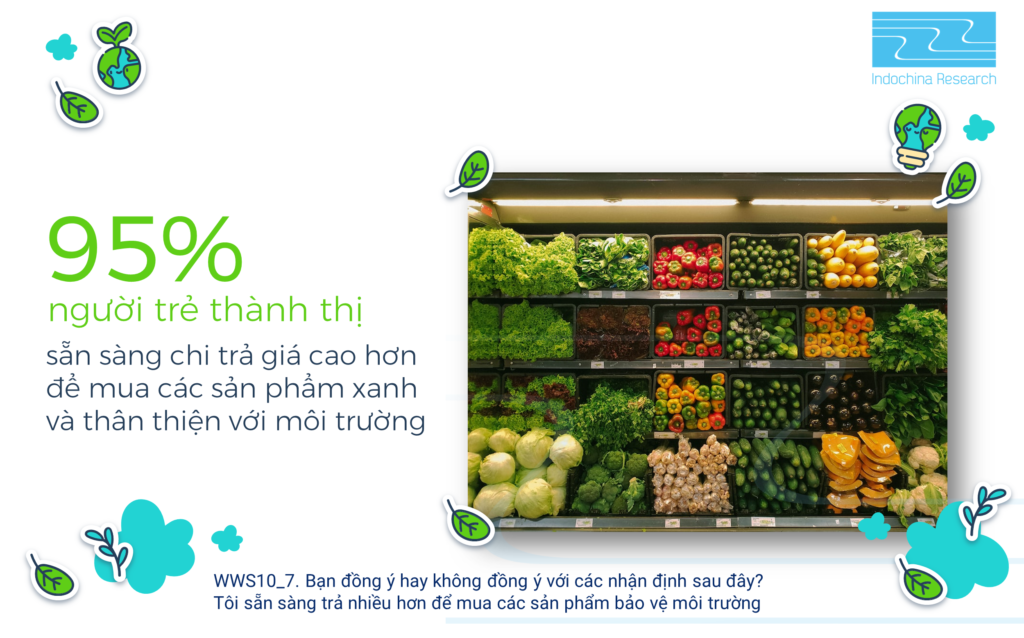
Liệu có thách thức nào trong việc mua các sản phẩm xanh?
Dù nhận thấy được tính hữu dụng của các sản phẩm xanh, song ý chí của người tiêu dùng, giá thành sản phẩm và tính sẵn có của sản phẩm trên thị trường vẫn là những rào cản không nhỏ với những người tiêu dung trẻ tuổi.
Bên cạnh đó, một thách thức khác mà người trẻ đang cân nhắc chính là niềm tin vào nhà sản xuất, do có những sản phẩm gắn mác hữu cơ trên thị trường nhưng lại không có bất kỳ giấy chứng nhận nào. Do đó, người tiêu dùng cần phải lựa chọn kỹ càng những sản phẩm có nguồn gốc xuất xứ rõ rang, được cấp giấy chứng nhận hữu cơ đáng tin cậy được cả thế giới công nhận như giấy chứng nhận thực phẩm hữu cơ nước ngoài (từ Mỹ và Châu Âu), tiêu chuẩn VietGap của Việt Nam,…
Nguồn:
– Nghiên cứu Online về Giới trẻ (12/2022 – 01/2023) tại Hà Nội và HCM,n =1500 thực hiện bởi Indochina Research Vietnam
– Nghiên cứu End Of Year 2022 (11-12/2022) tại 4 thành phố lớn Hà Nội, Hồ Chí Minh, Đà Nẵng, Cần Thơ, n=800 thực hiện bởi Indochina Research Vietnam
– Nghiên cứu về Thực phẩm hữu cơ (12/2022) tại Hà Nội và HCM, n=500 thực hiện bởi Indochina Research Vietnam.
Please contact us for all your research projects in South East Asia
[email protected].
Indochina Research, Regional know-how you can trust!
The post Ngày Trái Đất 2023: Doanh nghiệp chọn kinh doanh ‘xanh’ để thu hút giới trẻ appeared first on Indochina Research.
]]>